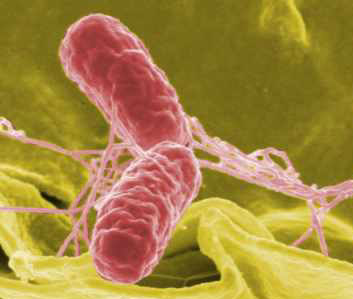We all know that what we eat can affect our risk of heart disease - for years health professional have been giving the message that cutting the amount of fat in your diet can help to cut your risk. But it's not clear exactly how a high-fat diet contributes to heart disease risk, as it's not a straight relationship between the fat you eat and the fatty compounds that get laid down in your arteries and cause problems. 
Now a new paper from researchers in the US, published in the journal Nature this week, provides an interesting new angle - they think that it might be the bacteria in your gut that turn fat in your diet into the gloop that clogs your arteries.
The scientists, led by Zeneng Wang, started off by taking a relatively new approach, known as metabolomics, to search for molecules in the body that might be involved in heart disease. They took blood samples from people who had suffered a heart attack or a stroke, and compared the levels of a range of small molecules in their blood with levels in the blood of healthy people.
Intriguingly, they found that people who had suffered heart disease had much higher levels of three molecules that are all produced in the body by the breakdown of phosphatidylcholine, or lecithin - a nutrient that's found in a wide range of foods, but particularly in fatty foods.
When you eat something containing lecithin, enzymes in your gut break it down to produce a molecule called choline. A lack of choline in the diet can cause liver disease and muscle damage, so it's pretty important. But then it gets interesting. Choline is then broken down by bacteria in the gut to produce trimethylamine - a chemical that stinks of rotten fish. This trimethylamine gets taken into your bloodstream and goes to the liver, where it's turned into trimethylamine oxide - and it's this chemical that seems to contribute to the formation of the fatty plaques that can clog arteries and cause disease.
To prove the link between a fatty diet and the levels of the bad chemical trimethylamine oxide (TMAO), the scientists gave a lecithin-rich diet to mice prone to developing heart disease. They found that the fatty diet increased the levels of TMAO in the animals' blood, and the mice had more artery-clogging plaques. And to show that the gut bacteria were involved, the researchers treated mice with some strong antibiotics that nuked all the bacteria in their gut. They found that trimethylamine oxide - the bad chemical - was no longer produced.
We need the bugs in our guts to help us digest our food and keep the gut healthy, so it's not practical (or even really possible) to just get rid of them all. But if scientists can identify exactly which species of bacteria are producing the trimethylamine, then it might be possible to specifically get rid of them. Alternatively, maybe researchers could hunt for some "good" bacteria that might help to control the bad bacteria producing trimethylamine.
And it might also be possible to develop drugs that specifically block the liver enzyme that converts trimethylamine into the plaque-causing TMAO. The research also helps to explain why a fatty diet, with lots of lecithin, might contribute to heart disease - interestingly, choline, produced from lecithin, is sometimes taken by people as a health supplement, so this work suggests that might not be such a great idea if you want to reduce your risk of heart disease.










Comments
Add a comment